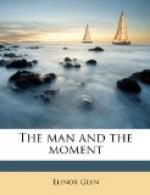over himself, for propinquity and the night were exciting
influence, and the cruel fact remained that it was
too late in any case. Henry’s words this
afternoon had cast the die forever; he—Michael—could
not for any personal happiness be so hideously cruel
to his old friend. Better put a bullet through
his own brain than that. Whatever should develop
on this night, and he meant to continue the conversation
as it should seem best to him, and if she fenced too
daringly with him to take the button off the foils—but
whatever should come of it it should not be allowed
to alter his intention of to-morrow instructing his
lawyers in Edinburgh to begin divorce proceedings at
once. He was like a gambler who has lost his last
stake, and who still means to take what joy of life
he can before the black to-morrow dawns. So,
in the ten minutes or so while Sabine had turned from
him, he laid his plans. He would see how much
he could make her feel. He would dance with her
later and then say a final farewell. If she were
hurt, too, he must not care—she had made
the barrier of her own free will. The person
who was blameless and should not suffer was Henry.
Then he began to look at Sabine furtively, and caught
the outline of her sweet, averted head. How irresistibly
attractive she was! The exact type he admired;
not too intellectual-looking, just soft and round and
babyish; there was one little curl on her snowy
nuque
that he longed to kiss there and then. What a
time she was talking to the other man! He would
not bear it!
And Sabine, while she apparently listened to her neighbor,
had not the remotest idea of what he said. The
whole of her being was thrilling with some strange
and powerful emotion, which almost made her feel faint—she
could not have swallowed a morsel of food, and simply
played with her fork.
At the first possible pause, Michael addressed her
again:
“Since you knew the lady in life who is now
my ghost—and she told you of Binko—did
she not say anything else about her visit to Arranstoun
or its master?”
“Nothing—it was all apparently a
blank horror, and she probably wanted to forget it
and him.”
“He made some kind of an impression upon her,
then—good or bad, since she wanted to forget
him—” eagerly.
Sabine admitted to herself that the umpires might
have called “touche” for this.
“It would seem so,” she allowed, with
what she thought was generosity.
“That is better than only creating indifference.”
“Yes—the indifference came later.”
“One expected that; but there was a time, you
have inferred, when she felt something. What
was it? Can’t you tell me?”
Excitement was rising high now in both of them, and
the grouse on their plates remained almost untasted.
“At first, she did not know herself, I think;
but afterwards, when she came to understand things,
she felt resentment and hate, and it taught her to
appreciate chivalry and gentleness.”




